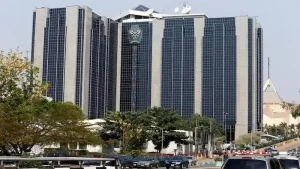Table of Contents
The top five banks are facing a shortfall of N1.5 trillion to meet the recently announced new minimum capital base by the Central Bank of Nigeria (CBN) for international commercial banks.


In a statement, the CBN revealed new minimum capital requirements for banks, significantly increasing the minimum capital base for commercial banks with international authorization to N500 billion from N50 billion, representing a 900 percent increase.

Join our Telegram Channel for Updates
Confirming this in Abuja, the Acting Director of the Corporate Communications Department, Mrs. Hakama Sidi Ali, stated that the new minimum capital base for commercial banks with national authorization has been raised to N200 billion, marking a 700 per cent increase from N25 billion.
She also disclosed that commercial banks with regional authorization must now meet a new requirement of N50 billion, representing a 400 per cent increase from N10 billion.
Moreover, Mrs. Sidi Ali revealed that the new minimum capital for merchant banks will be N50 billion, while the new requirements for non-interest banks with national and regional authorizations are N20 billion and N10 billion, respectively.
A circular signed by Mr. Haruna Mustafa, Director of the Financial Policy and Regulation Department, emphasized that all banks must comply with the new minimum capital requirement within 24 months, starting from April 1, 2024, and ending on March 31, 2026.
To assist banks in meeting the new capital requirements, the CBN recommended options such as injecting fresh equity capital through private placements, rights issues, and/or offers for subscription; engaging in Mergers and Acquisitions (M&As); or upgrading or downgrading license authorizations.
Furthermore, the circular clarified that the minimum capital shall consist of paid-up capital and share premium only, with Additional Tier 1 (AT1) Capital not eligible to meet the new requirement. Banks must also ensure strict compliance with the minimum capital adequacy ratio (CAR) requirement applicable to their license authorization.
The CBN noted that the new minimum capital requirement shall apply to all new applications for banking licenses submitted after April 1, 2024. Existing applications for banking licenses will continue to be processed, but promoters must bridge the gap between the deposited capital and the new requirement by March 31, 2026.
All banks are required to submit an implementation plan detailing the chosen option(s) for meeting the new capital requirement and various activities involved with their timelines by April 30, 2024. The CBN will monitor and ensure compliance with the new requirements within the specified timeline.
Regarding the top banks and their capital shortfall, under the new minimum capital requirement, each of the top five banks – Access Bank, FirstBank, GTBank, UBA, and Zenith Bank – must have a minimum capital base of N500 billion.
However, based on the latest financial results, these banks have a combined paid-up capital and share premium of N1.037 trillion, resulting in a shortfall of N1.472 trillion.
Access Corporation, the parent company of Access Bank, has a paid-up capital and share premium of N251.811 billion, resulting in a shortfall of N248.189 billion. FBN Holdings, the parent company of FirstBank, has paid-up capital and share premium of N251.3 billion, resulting in a shortfall of N248.66 billion.
GTHoldco, the parent company of GTBank, has paid-up capital and share premium of N138.186 billion, resulting in a shortfall of N361.814 billion. UBA has paid up capital and share premium of N115.815 billion, resulting in a shortfall of N384.185 billion. Zenith Bank has a paid-up capital and share premium of N270.745 billion, resulting in a shortfall of N229.255 billion.









